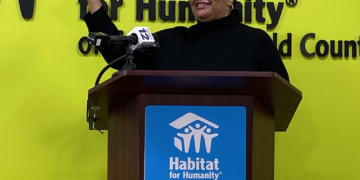With $30,000 you can buy a car or maybe place a down payment on a home. The Women”™s Business Development Council in Stamford is using that sum to fire six salvos in the form of microloans across the bow of small-scale business financing.
The WBDC for the remaining three business quarters of 2016 expects to make six microloans of up to $5,000 each.
The microloan money is part of a six-figure cash infusion from United Bank that was made public during a surprise October announcement at the Stamford Hilton. The announcement coincided with U.S. Treasury Department approval of the WBDC as a lending entity.
“We”™re very grateful for United Bank”™s seed money of $100,000 and we are very open to other financial institutions helping,” WBDC President and CEO Fran Pastore said recently in the WBDC”™s Bedford Street offices, home to 13 employees. “We”™re optimistic because we know these loans have real impact.” She also noted, “They get repaid.”
The first loans are going to existing WBDC clients. Pastore said without naming the beneficiaries that the loans typically get cars running to access jobs or repair at-home machines that women use to establish independent footholds in the economy. It is a concept that won the Nobel Peace Prize in 2006.
The loan money is part of far-flung WBDC enterprises that recently had Pastore ticking off the benefits of microloans while simultaneously shedding light on Ethiopian coffee and producing a bag of it from behind her office desk.
Both microloans and African entrepreneurialism are current active pings on Pastore”™s radar, which operates under the WBDC ethos of female business empowerment, although “10 percent of clients are male.” Besides its Stamford headquarters, the WBDC runs an office on Roosevelt Drive in Derby.
Financing is a historic obstacle to female advancement. Pastore said until 1988 and the passage of HR 5050, women in the U.S. were required to have males cosign for loans.
Pastore recently returned from Africa on a trip sponsored by The Achieve Institute, with offices in California and Greenwich. There she promoted the WBDC curriculum, which is designed to be tailored to local and individual needs.
She travelled with The Achieve Institute”™s Mary Lynne Heldmann, a 35-year Fortune 500 leadership consultant, whose presentation to Ethiopian entrepreneurs was titled, “Women Achieve: Keeping Women on the Move Goes to Africa.” The institute”™s website addresses a “systematic approach to peak performance” and said that for more than a decade it has helped management teams and executives “improve their performance and productivity. Consistent return on investment has led to wide adoption of the program in Fortune 100 companies.”
The institute”™s programs are designed to narrow the gender leadership gap, retain talent, optimize the performance of women leaders and encourage women to take on leadership positions in their workplace and communities.
Said Heldmann, “They were like sponges. They learned how to pick themselves up when feeling down, that operating with a sense of purpose lightens the load.” And she said, “We are ready to go back.”
The Africa trip witnessed the women teaching, among others, college juniors studying the sciences and technology. “Even with STEM training, the job market is tight and unemployment is high,” Pastore said. “These women know that starting an entrepreneurial venture is the path to economic empowerment and self-reliance.
“The WBDC is all about economic empowerment and economic equity through entrepreneurship and financial education,” she said. “We tailor our programs ”” whether in Africa or here in Connecticut ”” to be culturally and economically sensitive, but the constant is women”™s aspiration for self-reliance. It transcends culture and socioeconomics.
“When women have a seat at the table profits increase, communities flourish and economies thrive,” she said.




















